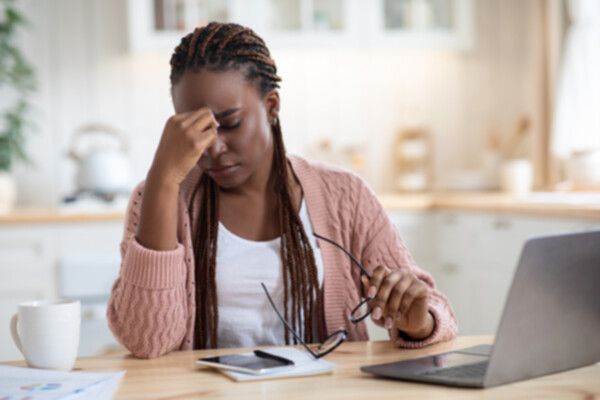Do you want to know how to combat stress quickly? What is effective in reducing stress in our lives? Discover 9 methods to remove stress from your life.

Stress is part of everyone’s daily lives. Although there is no way to change the surrounding circumstances, you can control the way you respond to them. Therefore, it is important to know how to remove stress In those moments that these sensations take too much control of our mind and body.
Although there are strategies to Eliminate stress in an effective way, the reality is that there is no single, valid option for everyone that involves relieving or reducing stress in each case. In fact, what works for some may not work for others. In this way, it may be interesting to know a wide variety of techniques to control stress or to reduce stress in some situations.
How to remove stress?
The objective of reduce stress It is not to get rid of this feeling completely. Thinking about eliminating stress completely is unrealistic, after all, it is an inevitable human response that we all experience from time to time. Furthermore, if this is perceived in a balanced way, it is not something that harms us, but, on the contrary, benefits us. However, everyone can benefit from knowing how to manage stress in different situations. Therefore, below, you will see some types to know how to combat stress in different situations:
- Understand your stress: To control or relieve stress It is important to learn how these situations affect us when we are stressed. In fact, learning when you experience stress allows you to better cope with the moments where you feel it and know the reason why you cannot deal with it correctly.
- Identify signs of stress: Everyone processes stress completely differently, so if you want reduce stress experience, it is important to know what individual symptoms you have. By recognizing the signs that indicate that you are stressed, you will be able to act on them and end up eliminating the stress that represents a barrier to acting in the best way.
- Make self-care a priority: Putting our well-being first is one of the best methods to reduce stress and anxiety of our lives. In this way, focusing on the simplest things in our daily lives can be very useful in lowering our body’s cortisol levels, that is, the stress hormone. Therefore, try to get enough sleep, have good eating habits, take time to rest, and exercise daily.

- Meditation: Although it is repeated ad nauseam, the reality is that one of the most effective methods to know how to relieve stress is precisely to practice meditation daily. Furthermore, meditation not only allows you relieve stress in the short term, but it implies being in the present. By focusing on the here and now, you won’t be able to ruminate on something that has happened or worry about the future.
- Focus on breathing: If you want to learn a quick way to know how to deal with stress, one of the keys will be to pay attention to your breathing. In fact, focusing on the way you breathe can make a big difference overall in combating stress. Plus, using breathing techniques will allow you to calm your body and brain in just a few minutes.
- Go for a walk: Physical exercise is a great method to calm, relieve or eliminate stress that you have been accumulating throughout the day. So, one of the things you can do when you are stressed or stressed is to simply clear your mind by taking a walk around your city or preferably through nature.
- Give a hug: Physical contact also allows you reduce stress. In fact, hugging a loved one can be especially beneficial. When you hug a person, oxytocin is released, a hormone that allows you to experience more happiness and reduce stress levels.
- Do an artistic activity: Art or doing a hobby that you like can also be a good method to calm nerves quickly and remove stress. Although it may seem counterproductive, because we may have a very long list of tasks to do, dedicating some time to these types of tasks can help motivate you and have more energy for other activities.

- Check your internal dialogue: The way you talk to yourself is also important. In fact, one of the ways you can know how to deal with stress It is precisely by observing your internal dialogue. If you constantly think things like ‘I don’t have time for this’ or ‘I can’t stand this’ you’re likely to become more stressed. Therefore, it is important to learn to talk to yourself in a more realistic and compassionate way.
- Express more gratitude: Thanking yourself for everything you have achieved can also help you lower and reduce stress. In fact, practicing gratitude for what you have around you can be a good stress management tool. In fact, recent research has shown that more grateful people tend to enjoy better mental health, less stress, and a higher quality of life.
The best way to know how to lower stress fast It is getting to know yourself and learning why you feel these sensations at certain times. Therefore, if you feel too much stress, an effective treatment is to go to a mental health professional. This way, you can eliminate excess stress from your life as soon as possible.
How to control stress on a daily basis?
Although you may often perceive stress as something that you experience in an unpleasant way for you, the reality is that this feeling is an evolutionary need. An optimal level of activation will help you carry out day-to-day activities and challenges, however, when this stress or activation is high, it can harm us, even generating serious consequences for our mental health. Luckily, there are strategies that can help fight stress, as well as to deal with all its consequences. Next, you can see here strategies that can help you:
- Find a balance in your day: To manage stress, it is important to try to structure your time so that every day you can have some time for yourself, to stop, enjoy, feel. There is a social belief of ” The more time I dedicate to my work/studies, the more productive I am.“, Which is a mistake. To be productive you need time to move, rest well, listen to yourself… This will keep your activation level optimal.
- Be kinder to yourself: People tend to be too critical of themselves. This type of relationship with yourself can make you feel worse and increase your stress. As Kristin Neff expresses in her book, if you change criticism for compassion, in the end you will have better results, increase self-esteem and avoid that overactivation that harms you so much. Therefore, instead of being so critical, try being much more understanding and deal with the situations that cause you stress by treating yourself as if they were your best friend.
- Lean on people you trust: If you are going through a very stressful time, having a friend or family member can help you deal with these feelings. The reality is that sharing your emotions and expressing your concerns is a method that will allow you to reduce stress.
- Keep a journal: Set aside time to reflect on your day. Having a personal diary can help you better deal with negative thoughts as well as those emotions that you may not know how to manage. This can be a useful tool to help you better understand your stressors and help you relieve everyday stress.
- Eat a balanced diet: In order to combat stress, diet is crucial. For example, skipping meals can lower blood sugar, which can lead to mood swings and fatigue. Poor diet and/or junk food also have effects on both physical and emotional health. Many researchers talk about the close relationship between a balanced meal and a good mood.
- Exercise regularly: When you exercise you secrete many hormones, including some hormones that you usually associate with happiness such as: endorphins, serotonin and dopamine. So not only does it help our physical health, but it also helps reduce stress levels.
- Have a good rest: The power of a good rest goes beyond what you imagine. Sleeping correctly, that is, respecting the recommended seven or nine hours and practicing the best possible sleep hygiene, can help you better manage stress levels.
- Practice relaxation exercises: Introducing moments of mindfulness, meditation, or relaxation into our daily lives can help you reduce and regulate the stress of the day, and help you prevent it from even appearing in the long run.
- Divide and conquer: Write down what causes you stress, divide it into the areas that are necessary. Put next to the level of stress that causes you, from 1, almost nothing, to 5, a lot of stress. With this ready, start with the ones that cause you the most stress and generate different solutions or action plans that come to mind. Little by little you will see how dividing it and starting to move will lower your stress, and with less stress you will accumulate fewer difficulties that add to that stress.
- Hug, kiss or shake hands: Something as simple as a caress can help you reduce the stress of our daily lives. The explanation behind this effect is that human contact slows down the release of cortisol (the so-called stress hormone), and increases the flow of endorphins, a feel-good chemical. Additionally, the feeling of connection with another person can also give you a different perspective. When you put a little love in your life, avoiding stress or reducing it is much easier.
- Spend time in nature: There is much research that emphasizes the psychological benefits of spending more time in natural environments. Walking in green spaces allows us to reduce blood pressure as well as the chemicals that contribute to our experience of stress. In fact, it has been shown that even looking out the window at nature can help us relieve stress.
- Improve your body posture: According to studies, slouching can lower your self-esteem, as well as worsen our mood. The brain and the body adjust in both directions depending on the emotion, that is, when you are stressed you adopt a more tense body posture, for example, and the other way around this relationship also occurs, if you have a tense, stiff, hunched posture, your Out of coherence, the brain begins to secrete cortisol. Therefore, being upright, stretching, and having an open body position can help you regulate that stress.
- Set limits: A good treatment for stress is precisely to try to set limits on those tasks that may not require such urgency. Therefore, it is essential to try to identify which commitments are priorities and reduce everything that does not require immediacy. If you are already at your limit, learn to stop accepting more requests. The key to knowing how to control stress is precisely knowing what your limits are and respecting them.
- Leave aside the screens: It has been shown that people who constantly check notifications tend to have not only attention deficit and a more harmful posture for us, but also a higher level of stress. Having time to pay attention to screens, and time in which you forget that they exist, is essential to disconnect and avoid excitation of our nervous system.
- Ask for help: Sometimes putting all this into motion is not enough and it is time to work on how we are living our daily lives. Going to a psychologist can help you get to know yourself, recognize what causes us stress and where it comes from, know how to deal with it and what skills we have, and learn different tools and techniques that can significantly improve your quality of life.
With our way of living life stress It seems to accompany us on most occasions. For this reason, we must learn to know how to deal with these feelings, since at some point or another they will reappear.








